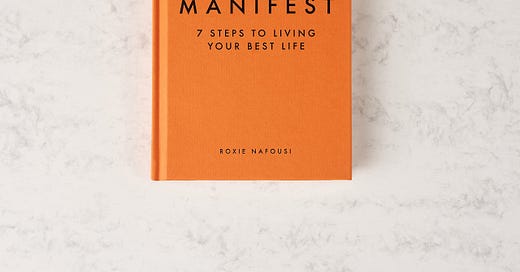A few weeks ago, I posted on Instagram about Roxie Nafousi’s heavily-hyped Insta-hit book, Manifest. Now a Sunday Times bestseller, the book is about manifesting your best life through vision boards and harnessing the energetic force of ‘the universe’ to attract everything from romantic love to your dream job.
I wanted to know what people thought because, while it’s easy to be sneery and cynical about such things, I’m fascinated by the science behind manifesting. Neuroscientist and senior lecturer at MIT, Dr Tara Swart, explained in her 2019 book, The Source, how things like visualisation and journalling actually prime your brain to make micro steps towards your goals every day.
I don’t believe - for example - that I could have manifested my way out of a breast cancer diagnosis. But, as a tool for focusing on what you want in order to get shit done, I do believe it works. Roxie commented on my post: ‘I hope you discover after reading this is that manifesting isn’t about magic at all, and it’s no “woo-woo”… it’s an actionable practice of self-development that I truly believe will benefit EVERYONE.’
She’s right about it being actionable. The book is firm that you can’t just think about money/your dream man/a house in LA and expect it to miraculously appear: you have to put in the work too. And her advice, from being clear about what you want, to aligning your behaviour (which ties in with what I wrote about how taking control of your identity can change your life), is self-development guidance that will certainly improve your chances of getting what you want in life - no manifesting magic required.
I concluded that I’m a spiritual realist. I enjoy the idea of manifesting, particularly when I can see the science behind it. And I’ve become more interested in gong baths and meditation and anything that creates good vibes as I’ve got older. I think this is quite common - look at Fearne Cotton’s book Bigger Than Us, or Holly Willoughby pivoting into spirituality with Wylde Moon. Perhaps you could say I’m woo-curious. I remain sceptical about much of the spiritual industry, particularly when it charges women a lot of money for moon dust or snake oil. But there is something to be said for the power of a talisman: if you believe it works, it works.
When I finished chemo and was about to have my mastectomy, two friends gave me a rose quartz necklace because it’s said to have healing properties. And I truly do feel that it’s healing me when I wear it - but is it the crystal, or is it because it represents love and friendship? I doubt it would have the same power had I bought it myself.
Last year, I went to a women’s circle for a friend’s birthday. Despite my ingrained cynicism, I found it deeply moving and galvanising. The experience of sharing how we’re feeling about the shit that life has thrown at us, in a structured way with burnt sage and deep breathing (rather than the usual method of over a bottle of rosé), felt so restorative I wondered why my friends and I don’t do them more often.
I recently met Anoushka Florence, founder of the Goddess Space, to learn about her book The Women’s Circle. She encouraged me to pick at random from a deck of goddess cards. Now, anything approaching tarot is a turn-off for me - it all just feels a bit fairground magician. But the first card I picked from the deck was The Mother, with an image of a woman holding a child while a scary face lurked beneath her dress, and I found myself crying as I described trying to protect my young children from the grimmest aspects of breast cancer. The second card I picked was Hecate, standing at a crossroads, which could represent the transition of coming to the end of cancer treatment. ‘Now that you’ve picked that card, you’ll probably find that you see Hecate in random places,’ explained Anoushka. Okaaaaay, I said to myself, having not thought about Hecate since reading Macbeth in school.
But the next day, I opened Eleanor Mills’ newsletter, The Queenager, where she had written about the Feminine Power exhibition at the British Museum. She was struck, she wrote, by the ‘female monsters, demons and witches’, notably Hecate who ‘represents transition – those moments when life shifts, those liminal spaces where we are no longer what we were but have not yet become what we are destined to be.’
So, yeah, I’m still a spiritual realist. But maybe there is a bit of magic out there after all?
This week I’m…
Inspired by J-Lo’s immense work ethic in Halftime, launching on Netflix tomorrow
Lusting after a high-end dustpan and brush thanks to the unlikely chicifying of the humble hardware store
Hoping that NICE will soon approve Trodelvy, a life-extending drug for women with advanced triple negative breast cancer, for use within the NHS
Realising, thanks to Oliver Burkeman, that 'there’s no impending moment of truth when you’ll finally feel in a better position to do whatever it is you really want to do with your time – and that the only viable moment in which to do it is right now.’







Loved this, I'd consider myself woo-curious too.
I agree with your view on why manifestation works - you believe something, you visualise it, and you subconsciously make it happen. I think the times in my life I've not moved forward is because I've been flailing around without a clear goal. I do really want to get back into setting goals/making things happen/improve my mindset, so I might get this book and give it a whirl.